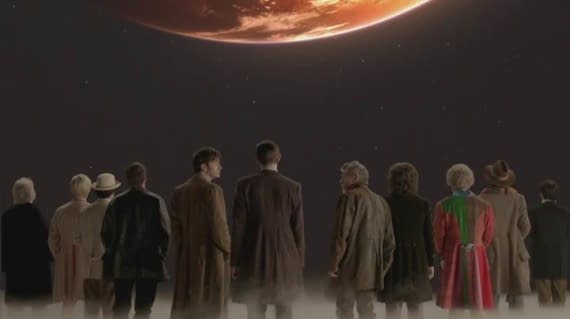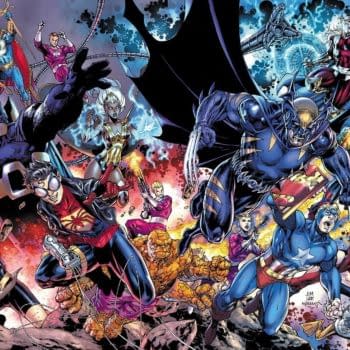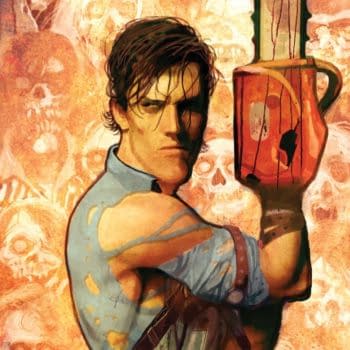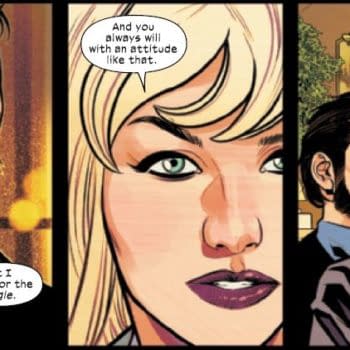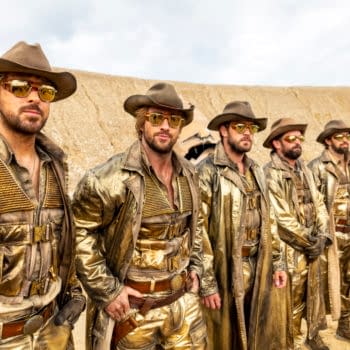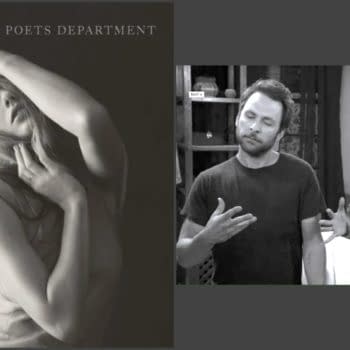Posted in: Look! It Moves! by Adi Tantimedh, Movies, Recent Updates, TV | Tagged: doctor who
Diving Into Doctor Who's 50th Anniversary – A Look! It Moves! Special
Adi Tantimedh writes;
If you lived on the internet, you'd think the biggest cultural event of the last week was the Doctor Who 50th Anniversary, and in that respect, you'd be right. For geeks and fans, it was like their Royal Wedding, a global communion, Nerd Superbowl, if you will.
It was all very enjoyable, the surprise online prequel episode starring Paul McGann, the social history drama about the show's origins An Adventure in Space and Time, the special itself The Day of the Doctor, even The Five(ish) Doctors Rebooted comedy written and directed by Peter Davison. I regard them all as of a piece, part of the BBC's initiative to reinforce its global branding and business model.
You could argue that Doctor Who is one of the shows keeping the BBC alive. It nets them at least $100 million a year in foreign sales and licensing – I don't think there's much of a market for Eastenders action figures but you try to keep the David Tennant Doctor figure on the shelves at any shop. The show isn't just well-made. Its marketing has been carefully and expertly orchestrated by the BBC to encourage more attention and popularity in order to be relevant both as a broadcaster and maker of original intellectual property.
I take the TV movie An Adventure in Space and Time as a complement to The Day of The Doctor. Ostensibly a social drama, it posits the struggle to launch the show in the Sixties as an underdog outsider production, since its creator, then-Head of Drama Sydney Newman was Canadian, producer Verity Lambert was Jewish and the first woman promoted to producer at the BBC, director Waris Hussein was Indian-born, and William Hartnell was a respected character actor stuck in a rut. Doctor Who was always a show treated with skepticism, snobbery and contempt at the BBC despite its popularity with the viewing public, all the way to its original cancellation in the 1980s.
What's striking about the TV movie is the way the script not only deconstructs the appeal and structure of Doctor Who the show, but also echoes the effect the Doctor has on its audience then and now. David Bradley's Hartnell becomes another person – one of the first – who's saved by The Doctor. Gatiss' script and Bradley's heartbreaking performance portrays Hartnell as essentially a child at heart with unresolved wounds that are healed by the role, finding redemption and a surrogate family, one that he ends up losing again when they leave, and he has to endure The Doctor's loneliness until he himself has to leave. The TV movie also shares with Peter Davison's hilarious The Five(ish) Doctors Reboot the theme of how actors identify and become emotionally invested with the parts they play.
An Adventure in Space and Time and The Day of The Doctor serve as a suitable double feature. It's in the former that we're reminded that The Doctor was thus named as an authority figure to reassure the audience watching the show, a hero to make everything all right.
One criticism about Moffat's run of Doctor Who has been its fanservice-ness, the way it has become about itself, but there are still deeper meanings that explain the resonance that fuels the fanservice. The current version of Doctor Who is not just fan wank when you consider all the commercial, political and social circumstances behind it. The show and its hero are the ideal of how Britain would like to see itself. Not the terrible, venal and selfish Britain of the Tories, not the cynical compromised glitzy Britain of New Labour, but how ordinary Brits would like to see Britain: as liberal, tolerant, and humane. As national exports go, it's far more pleasant than military weapons. There are still aspects of the show and the character that hark back to Britain's survival of the Second World War: even in The Day of the Doctor, the bombing of Gallifrey visually recalls The Bllitz. As with many British TV series of the Sixties and Seventies and up to the present, the show has always been overtly anti-fascist, with the ongoing fight against the Daleks signifying a never-ending fight against its potential rise. The Doctor's intervention in the affairs of different worlds and societies could be read as a kind of soft imperialism where he doesn't try to conquer or colonise them so much as spread British liberal values of democracy and tolerance. Even The Doctor himself has always been a complicated hero – as a member of the elite Time Lord caste of Gallifrey, he is upper class, but an aristocrat who shuns his own kind to hob-nob with the common people and the downtrodden in acts of benign paternalism. He's like a posh social worker or, as many who grew up watching him would testify, babysitter.
The Day of The Doctor is not a stupid show. The script and direction has been full of literary, poetic and philosophical references about morality and ethics. John Hurt's Doctor is all regret and guilt and sadness of old age, he is King Lear who becomes Prospero by the story's end when he finds forgiveness and redemption. The Day of The Doctor is about second chances, finding an alternative to murder and genocide, doing good. Under all the fanservice, the fun Science Fiction visuals and special effects, is the romance of doing good, of being clever enough to find the best solution, the ethically right thing to do, of choosing an alternative to violence and murder. It's a fable about coming to terms with one's past self, about a doctor who finally remembered who he was supposed to be, healed himself and found his second chance.
Doctor Who is a carefully calculated commercial product that's not only an important earner for the BBC, but has also become an important cultural and social British import. On top of its celebration of British humour, eccentricity and liberal values, it also now films in prime Central London locations designed to attract tourists. It's also not for nothing that Queen Elizabeth I was written into the story as a signifier of the show and the hero's Britishness. The simulcast of the anniversary special in 94 countries on Saturday, the widespread buzz and celebration are all fun but also part of a marketing campaign and an expertly-orchestrated one. That Doctor Who is now a calculated product is not a bad thing. It always had been, and even more so now. The calculation the writers and producers put into it is not cynical but loving, since they are themselves fans, unlike many other movies and TV shows.
It's a fascinating perfect storm of pop culture phenomenon, geek worship and national cultural artifact.
Losing and gaining time at lookitmoves@gmail.com
Follow the official LOOK! IT MOVES! twitter feed at http://twitter.com/lookitmoves for thoughts and snark on media and pop culture, stuff for future columns and stuff I may never spend a whole column writing about.
Look! It Moves! © Adisakdi Tantimedh






